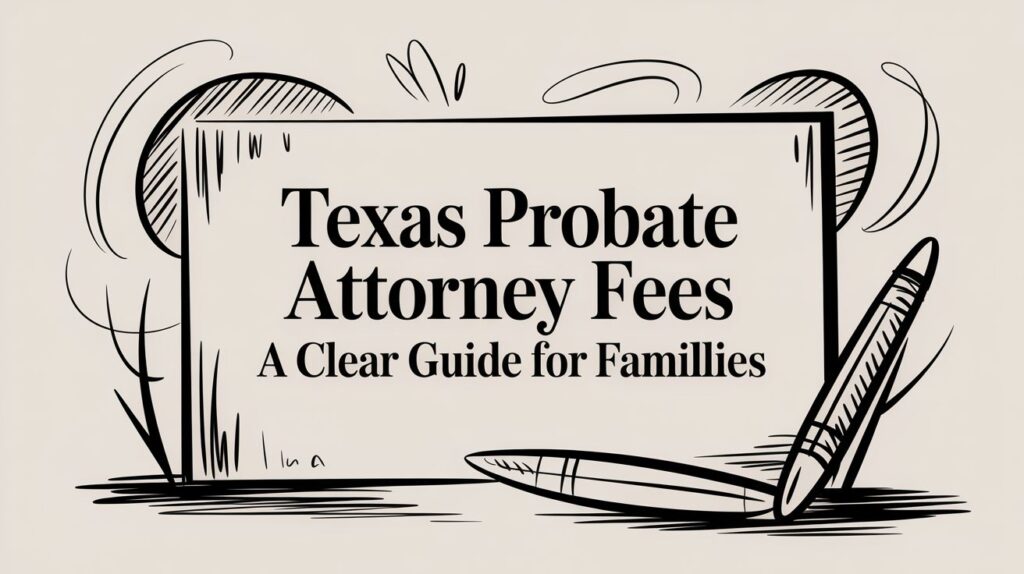If you’ve ever served as an executor or beneficiary, you’ve probably asked, when does probate end in Texas? It’s a fair question—probate can feel endless, wrapped in red tape, court deadlines, creditor notices, and paperwork. While the probate process in Texas is often smoother than in other states, it still comes with strict legal requirements, especially when it’s time to bring it to a close.
In this in-depth article, we’ll explain everything you need to know about when probate ends in Texas, including how to file the final accounting, closing documents, and get that crucial sign-off from the court. Through real-life examples and a conversational tone, we’ll demystify what can feel like a legal maze. Whether you’re an executor trying to tie up loose ends or a family member awaiting distribution, this guide was written for you.

What Is Probate, and Why Does It Matter in Texas?
Before we answer when does probate end in Texas, it’s worth stepping back to clarify what probate actually involves. Probate is the legal process of proving a will (if one exists), paying off debts, and distributing assets to heirs or beneficiaries. The process is managed through Texas probate courts and can vary slightly depending on whether it’s an independent or dependent administration.
Texas is known for having one of the more streamlined probate systems in the U.S., especially with its independent administration option. This allows executors to act with minimal court oversight, saving time and reducing costs. However, the court still expects proper documentation, especially as probate nears its end.
Knowing when probate ends in Texas isn’t just a matter of watching the calendar—it depends on completing specific legal steps and paperwork.
Real-Life Story: Tom’s Fourteen-Month Probate Journey
Tom, a middle-aged engineer in Plano, was named executor in his uncle’s will. He thought it would be a three-month affair—read the will, pay a few bills, sell a car, and cut some checks. What he didn’t anticipate was the depth of the process. He had to file the will for probate, notify creditors, wait for claim deadlines to pass, sell a house, deal with a disputed life insurance policy, and account for missing stock certificates.
It took fourteen months from start to finish. The probate court finally closed the case when Tom submitted a detailed final accounting and proof that all obligations were settled. When people ask, when does probate end in Texas, Tom now answers, “Not until you’ve crossed every ‘t’ and dotted every ‘i’—twice.”
The Three Big Milestones That Signal the End of Probate
To truly answer when does probate end in Texas, you need to understand the three core milestones that must be reached before the court will consider the estate closed:
1. All Debts Must Be Paid or Resolved
You cannot close probate in Texas until you’ve properly dealt with debts. That means:
- Notifying creditors
- Waiting for creditor claim deadlines to pass (generally four months after notice)
- Paying valid debts in priority order (funeral costs, taxes, etc.)
- Resolving any disputes with claimants
Unresolved creditor issues can delay closing indefinitely.
2. All Assets Must Be Distributed
Before filing closing paperwork, the executor must ensure:
- Property has been transferred to heirs or beneficiaries
- Title changes have been recorded (especially for real estate and vehicles)
- Personal property has been distributed according to the will orintestacy laws
If assets are still hanging in limbo, probate isn’t over.
3. The Final Accounting Must Be Filed
This document summarizes:
- All income and expenses since probate began
- A detailed report of debts paid and distributions made
- Any remaining funds
- Court costs or legal fees

If the judge approves the final accounting, you’re nearly there. Without this step, the probate court won’t authorize closure.
What Is the Final Accounting, and Why Is It Crucial?
The final accounting is the executor’s detailed financial report to the court, showing how the estate was handled. This document proves transparency and ensures heirs were treated fairly. It’s also your answer to the central question: when does probate end in Texas? It ends after this step is completed and approved.
Typical elements of a final accounting include:
- Beginning balance (what the estate was worth at the start)
- Itemized list of payments (funeral costs, taxes, debts)
- Itemized list of distributions to heirs
- Ending balance (what remains, if anything)
- Proof that no taxes or obligations are pending
The court doesn’t want shortcuts here. Even a small error could delay closure or result in objections from heirs.
Filing a Final Accounting in Independent vs. Dependent Administration
Independent Administration
In Texas, most wills allow for independent administration. This means the executor doesn’t need court approval for every move. However, some courts still require a closing affidavit or informal final report to be filed—even in independent estates.
To wrap up, an independent executor usually files:
- A closing affidavit or declaration
- A simplified accounting, depending on court preference
- Final receipts or signed acknowledgments from beneficiaries
Dependent Administration
In dependent administration, the executor must file a formal final accounting and get the judge’s approval before closing the estate. This is more time-consuming and must follow Texas Estates Code Chapter 362.
The dependent executor must also:
- Provide notice to all interested parties
- Respond to any objections filed
- Appear at a hearing if the judge requests clarification
This is why understanding the administration type is critical when determining when does probate end in Texas—because each follows a different route to the finish line.
Final Distribution: The Last Step Before Probate Closes
Once the final accounting is approved, and the judge finds everything in order, the executor is typically authorized to distribute any remaining funds or property. In some counties, the court will issue an order of final discharge, formally releasing the executor from further duties.
In practical terms, this means:
- Checks can be written to beneficiaries
- Property deeds can be finalized and transferred
- Financial accounts can be closed
- The estate can be legally terminated
Only after this final distribution can you truly say probate has ended.
Real-Life Story: Dana’s Smooth Closing with Final Discharge
Dana served as executor for her father’s modest estate in Harris County. After months of handling paperwork, taxes, and a small real estate sale, she filed her final accounting with the court. She also submitted signed receipts from each beneficiary, showing they received their full share.
The judge reviewed her filings, issued a final discharge, and congratulated her on a job well done. Probate was officially closed—and Dana could finally breathe.
When people ask her, when does probate end in Texas, she simply says: “When you’ve done everything by the book and have the court’s signature to prove it.”
What Happens If You Don’t File Closing Documents?
Failure to properly close an estate in Texas can lead to several problems:
- The estate remains open on court records indefinitely
- Executors may remain liable for taxes or creditor claims
- Heirs may dispute distributions later
- Future legal action could be required to finish what was left undone
- Real estate or financial titles may remain clouded

So if you’re asking, when does probate end in Texas, remember this: it doesn’t truly end until the court gets what it needs—and says so in writing.
Can Probate End Without a Final Accounting?
In some informal cases or small estates, especially under muniment of title proceedings, there may be no requirement to file a formal final accounting. This shortcut applies only if:
- There are no unpaid debts (except those secured by real estate)
- The estate qualifies under Texas Estates Code §257
- The will is self-proved and uncontested
This option can speed up the timeline considerably, but it’s not available for all estates. For traditional probate cases, the final accounting remains a requirement.
How Long Does Probate Take in Texas?
Timelines vary, but here’s a general breakdown:
- Simple estates: 6–9 months
- Moderate estates: 9–14 months
- Complex estates (business assets, contested wills): 18+ months
When people ask, when does probate end in Texas, it’s often out of frustration. But delays usually result from issues like:
- Waiting on tax clearance
- Problems with real estate sales
- Disputes between beneficiaries
- Creditor claims
- Missing paperwork

The key is organization. Executors who keep detailed records and stay proactive often finish faster.
Final Thoughts: When Does Probate End in Texas?
So, when does probate end in Texas? Legally, it concludes once the executor or administrator has paid off all debts and taxes, properly distributed the assets to the rightful beneficiaries, filed the final accounting along with the necessary closing documents, and received final approval and discharge from the court. In a practical sense, probate ends when every legal duty has been fulfilled, every concern among family members has been resolved, and every required document has been accepted by the court without issue. While Texas offers a relatively streamlined probate system, it only runs smoothly when handled with attention to detail and care. Whether you’re just beginning the probate process or preparing to close an estate, understanding exactly when probate ends is essential to completing the process with confidence, accuracy, and respect for your loved one’s legacy.








